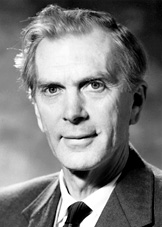
Back مارتين رايل Arabic مارتين رايل ARZ مارتین رایل AZB Марцін Райл Byelorussian Мартин Райл Bulgarian মার্টিন রাইল Bengali/Bangla Martin Ryle Catalan Martin Ryle Czech Martin Ryle Danish Martin Ryle German
This article needs additional citations for verification. (September 2021) |
Sir Martin Ryle | |
|---|---|
 | |
| Born | 27 September 1918 Brighton, England |
| Died | 14 October 1984 (aged 66) Cambridge, England |
| Education | Bradfield College |
| Alma mater | University of Oxford (BA, DPhil) |
| Known for | Aperture synthesis Radio astronomy |
| Spouse |
Rowena Palmer (m. 1947) |
| Awards |
|
| Scientific career | |
| Fields | Astronomy |
| Institutions | |
| Doctoral advisor | J. A. Ratcliffe[1] |
| Doctoral students | Malcolm Longair[1][2] Peter Rentzepis Jan Högbom[3] John E. Baldwin |
Sir Martin Ryle FRS[4] (27 September 1918 – 14 October 1984) was an English radio astronomer who developed revolutionary radio telescope systems (see e.g. aperture synthesis) and used them for accurate location and imaging of weak radio sources. In 1946 Ryle and Derek Vonberg were the first people to publish interferometric astronomical measurements at radio wavelengths. With improved equipment, Ryle observed the most distant known galaxies in the universe at that time. He was the first Professor of Radio Astronomy in the University of Cambridge and founding director of the Mullard Radio Astronomy Observatory. He was the twelfth Astronomer Royal from 1972 to 1982.[5] Ryle and Antony Hewish shared the Nobel Prize for Physics in 1974, the first Nobel prize awarded in recognition of astronomical research.[6] In the 1970s, Ryle turned the greater part of his attention from astronomy to social and political issues which he considered to be more urgent.
- ^ a b Martin Ryle at the Mathematics Genealogy Project
- ^ Longair, Malcolm Sim (1967). The evolution of radio galaxies. lib.cam.ac.uk (PhD thesis). University of Cambridge. OCLC 657635513. EThOS uk.bl.ethos.648088.
- ^ Högbom, Jan A. (1959). The structure and magnetic field of the solar corona. cam.ac.uk (PhD thesis). University of Cambridge.
- ^ Graham-Smith, Francis (1986). "Martin Ryle. 27 September 1918 – 14 October 1984". Biographical Memoirs of Fellows of the Royal Society. 32. Royal Society: 496–524. doi:10.1098/rsbm.1986.0016. S2CID 71422161.
- ^ About Sir Martin Ryle
- ^ Press release about Martin Ryle's Nobel Prize.